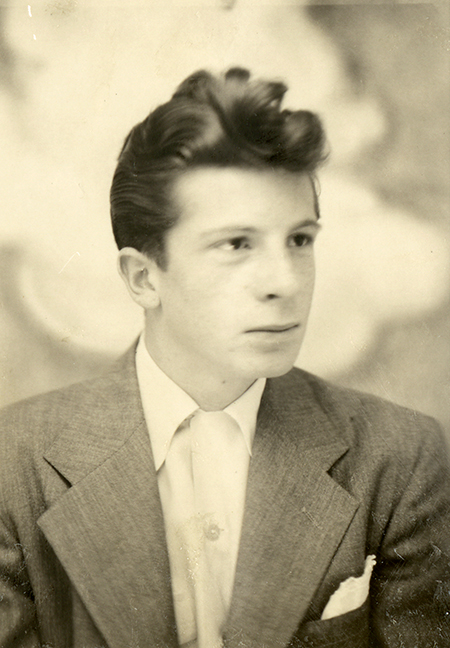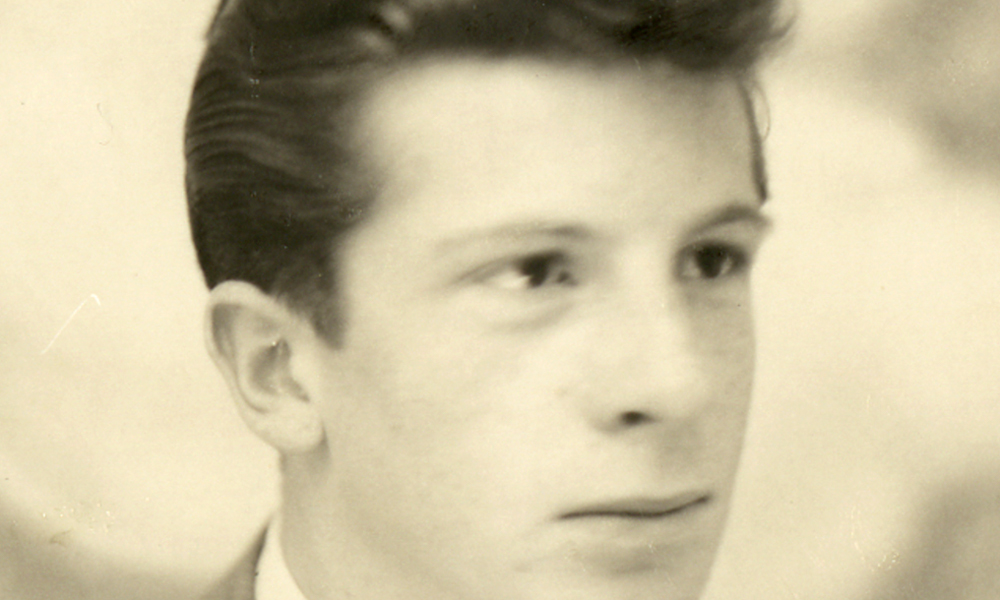As the Toyko Games begin, we remember an alumnus who rose from post-World War II chaos in Europe to the world’s sports stage.

Thousands of men and women have been student-athletes at the University of Rochester, but only a select few have competed on the world stage at the Olympic Games.
One of the most prominent was Zenon Snylyk ’55, a native of Ukraine (then part of the Union of Soviet Socialist Republics, or USSR) who served as captain of the 1956 US men’s soccer team at the Summer Games in Melbourne, Australia.
Throughout his career, he represented his adopted country in 92 international matches, including the Pan American Games (he helped the team win a bronze medal in 1959) and World Cup.
Snylyk, who played the position of forward, was easily recognizable by his small size (five-foot-seven) and flaming red hair. Opponents would yell “Get Red!” or “Stop Red!”—usually to no avail.
“Zenon was both highly skilled and fiery in demeanor on the field,” says former Rochester teammate John Braund ’53. “I never saw him make a dirty or physically aggressive move on a competitor. He didn’t need to. He was so quick and shifty in moving the ball.”
Braund describes how Snylyk would place his foot over the ball, “then move in an opposite direction with such a fake that the player covering him would fall to the ground without ever being touched by Zenon.”
Born in Ukraine in 1933, Snylyk fled with his family to Allied-occupied Germany after World War II. They lived in a displaced persons camp from 1945 to 1949, when they moved to Rochester.
Snylyk played soccer at Franklin High School and arrived at the University in 1951. Through high school and college, he also played for a club soccer team his father founded called the Rochester Ukrainians. He earned All-America soccer honors for Rochester in 1953 and 1954, one of only 55 collegiate players selected from all levels.
While a student, he was the youngest player chosen for the 1954 World Cup. But in what he called his greatest disappointment, Snylyk was ruled ineligible because he wasn’t a US citizen. A year later, he graduated from Rochester with a bachelor’s degree in political science and also gained US citizenship. And a year after that, he was named captain of the US Olympic team.
“I was aware of his greatness,” says Tim Schum ’60, who played men’s soccer and earned a place in the University’s Athletic Hall of Fame along with Snylyk. “He wasn’t a highly physical player, but he had exceptional ball control and mastery of the tactics of the game. I think his captaincy of so many national teams was because he was highly respected by teammates.”
After graduating from Rochester, Snylyk headed to the University of Chicago to pursue a master’s degree in political science. While there, he played for another club soccer team, went through local and regional tryouts for the US team, then shined brightest in the game that would decide the American team: a contest between the Western and Eastern All-Stars in St. Louis. Snylyk scored the lone goal for the Western team in a 1–1 tie and was named most valuable player of the game. He was named to the Olympic team, which he called “a real thrill, of course.”
The US team reached the quarterfinals, where it was defeated by Yugoslavia.
After the Olympics, Snylyk played for teams ranging from the Montreal Ukrainians and the Chicago Levy to the Toronto Ukrainians and the Newark Ukrainian Sitch, before retiring in 1970. At times, he would play for two teams in the same season, commuting between cities by airplane.
He served as editor of The Ukrainian Weekly newspaper from 1962 to 1980, then was editor of the Ukrainian-language newspaper Svoboda before retiring in 1988. When the Soviet Union’s government downplayed the Chernobyl nuclear accident in 1986, Ukranian-Americans in Snylyk’s community came to him, telling him that they had relatives who had perished at Chernobyl. Snylyk’s articles were read by the American press, who began calling it the disaster that it was.
Snylyk died at his home Berkeley Heights, New Jersey, in 2002. He was inducted into the University’s Athletic Hall of Fame in 2005.
“His playing career took place at a time when US soccer was dominated by recent immigrants who kept the game alive in urban areas of the country,” Schum says. “The fact that those in the metro areas thought so highly of his play is a testament to his legacy as one of the country’s elite players of his era.”





